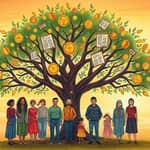
Financial freedom isn’t just a personal goal; it can transform societies, unlock potential, and shape global prosperity. By understanding its dimensions, embracing actionable steps, and addressing systemic barriers, we can chart a course toward a world where individuals and nations thrive together.
At its core, financial freedom means living debt-free with enough resources to pursue passions without reliance on a traditional job. More specifically, it involves having sufficient income, savings, and investments to meet both current and future obligations, fostering true independence.
Financial freedom often includes three pillars: emergency funds that shield against unexpected shocks, investments that compound wealth over time, and a lifestyle aligned with your values rather than your paycheck. It’s not merely about accumulating money; it’s about securing peace of mind and choices.
Stress related to money ranks among the top contributors to anxiety and physical ailments. Achieving financial freedom can alleviate this burden, leading to improved mental and physical health.
Indicators that you’re on track include living within your means, maintaining an emergency fund covering three to six months of expenses, and avoiding or eliminating high-interest debt.
Understanding global and national metrics helps quantify where we stand and what’s possible. In the United States, the average individual equates financial independence with an annual income of at least $94,000.
Yet only 11% of Americans report living their definition of financial freedom, while U.S. credit card debt soared to a record $1.031 trillion in 2023. Half of adults define freedom as a comfortable lifestyle, and 54% equate it with being debt-free.
Economic freedom at a societal level extends beyond personal finances. It encompasses low government interference, open markets, the rule of law, and competitive economies. Measured by the Heritage Foundation and Fraser Institute indexes, these factors strongly correlate with national prosperity and well-being.
Countries with higher economic freedom exhibit dramatically higher incomes among all citizens, not just the elite. For instance, the poorest 10% in the freest economies earn more than $7,000 annually, compared to $728 in the least free nations. Average life expectancy can be 20 years longer, and literacy rates and access to clean water improve significantly.
Despite an overall increase since 2000, recent setbacks after the COVID-19 pandemic have highlighted the fragility of economic freedoms when regulation and public debt surge indiscriminately.
High personal and public debt levels, limited investment freedom, and inflationary pressures pose significant hurdles. In many countries, government intervention in markets restricts individual choices and hampers the flow of capital where it’s needed most.
Behavioral obstacles are equally daunting. Overspending, inadequate emergency savings, and low financial literacy can trap individuals in cycles of debt and anxiety. Policy missteps—such as poor inflation management—erode purchasing power and savings, making progress feel out of reach.
Building financial self-efficacy—confidence in your ability to manage money—can multiply the effectiveness of these steps. Small wins, like clearing a small debt or opening a retirement account, reinforce positive habits.
Financial freedom isn’t a solitary achievement; it’s a catalyst for wider societal change. As individuals secure their own futures, they contribute to stronger communities, robust economies, and healthier democracies.
By advocating for policies that enhance economic freedom, supporting educational initiatives, and sharing best practices, we can uplift entire nations. Imagine a world where every child grows up in an environment that fosters both personal and economic liberty—a world where financial fear is replaced by hope.
Whether you’re just beginning your journey or refining your strategy, remember that every decision counts. By combining personal discipline with a vision for collective progress, financial freedom becomes more than a dream—it becomes a reality that benefits us all.
References





